DEER SKINNING AND QUARTERINGSince 2002, I have processed all my deer harvested taken with bow and
arrow, muzzleloader, revolver and rifle. Back in the late
1970s there were not any small Mom and Pop type wild game processors nearby and
only a few regular abattoirs would process wild game with later regulations
prevented that from happening. It was not until the 1990s when a
few small part time deer processors came on the scene offering their
services and was welcomed by the hunters. Prior to 2002, I processed
deer myself when the weather was conducive to hang them outside for a few
days, but the weather doesn't always cooperate with you which required you
to process the deer immediately.
As with most things, prices
continued to rise and a small deer processed would cost you around 65
dollars and you might end up with 20 pounds of actual meat if you were
lucky. After loosing a deer in 2002 to a deer processors freezer going
out, I decided to process all my deer myself since I already had a meat
grinder and other required items and only had to obtain a refrigerator to age the deer once skinned
and quartered which is the topic of this short story.
The real work begins after the deer is down and
field dressing in my case is
mandatory which renders a much better product in my humble opinion. A
few sequence pixs are posted with narrative comments and as the ole cliché,
"A picture is worth a thousand words"
and will start with the field dressed deer hanging ready for skinning.
NOTE: If the outside temperature is between 50 degrees F. and
35 degrees F., I will let the deer hang with the skin on several days before
skinning, quartering and processing. The ideal temperature is around
40 degrees F. and far above 50 degrees today so will immediately skin and
quarter the deer:
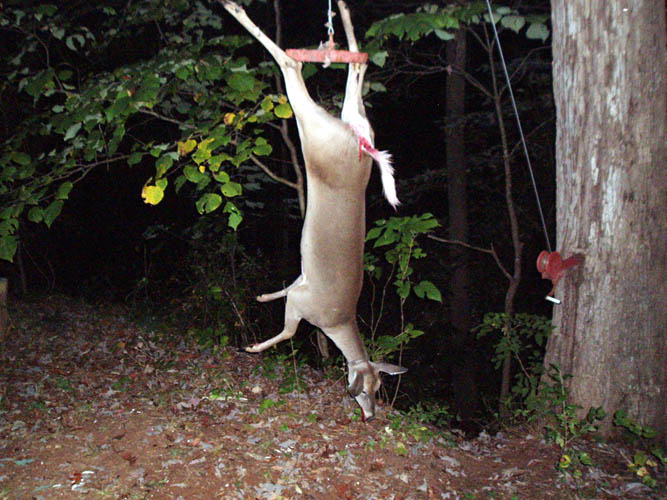
Use care when cutting between the deer's hind quarters
tendons and the lower shank because if you
sever the tendon you will have to jerry or jury
rig an alternate means to hang the deer. Above is an
ole antique metal
single tree that I shortened up and changed the hooks on
each end to allow to properly grip the hindquarter tendon. Also, there
is a
boat trailer wench secured to the large white oak tree with a steel cable to easily
hoist the deer carcass at the
necessary working height. I have actually used a rope and trailer hitch
on a car to pull the hide from a deer many years ago. Now, most processors
use an electric overhead chain hoist to hoist the deer up and pull the hide from the deer
at the same time with anchors secured into the concrete floor for attachment
of short cables to the deer's hide at each hindquarter.
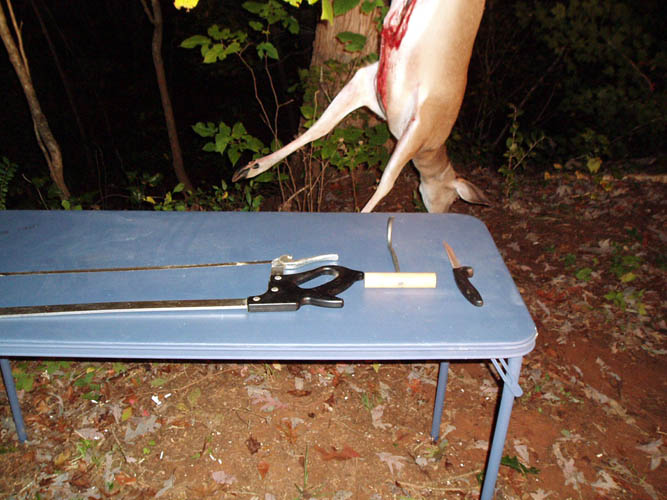
Only a few basic tools are needed to skin and quarter a deer; some type
of table or stand (optional), knife, meat hook and meat saw.
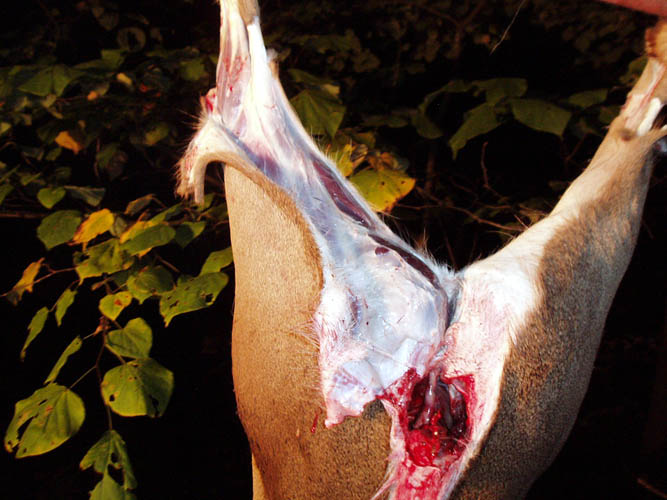
Your first cut will be around the shank being careful not to cut into the
tendon and only cut through the deer's hide and then a cut made from the
base of the hindquarter terminating at the shank. Use the back of the knife blade
and only allow the point under the skin and this is where a drop point knife
earns its keep which keeps the point away from the meat and excess hair off
the meat.
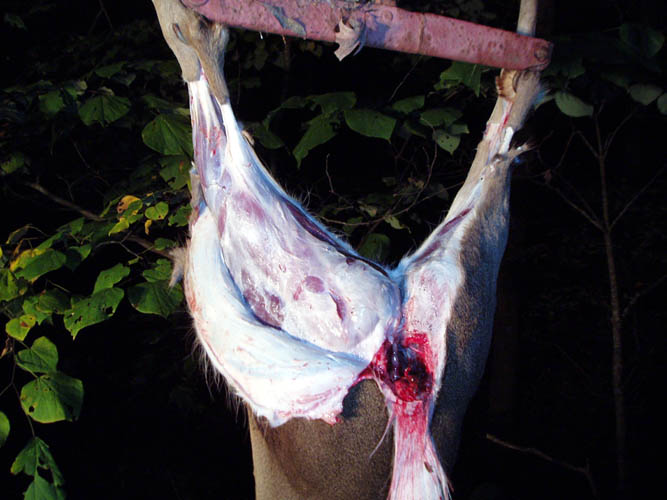
Continue pulling on the hide and use the point of the knife blade to
assist in removing the hide and try not to make any deep cuts into the
hindquarter.
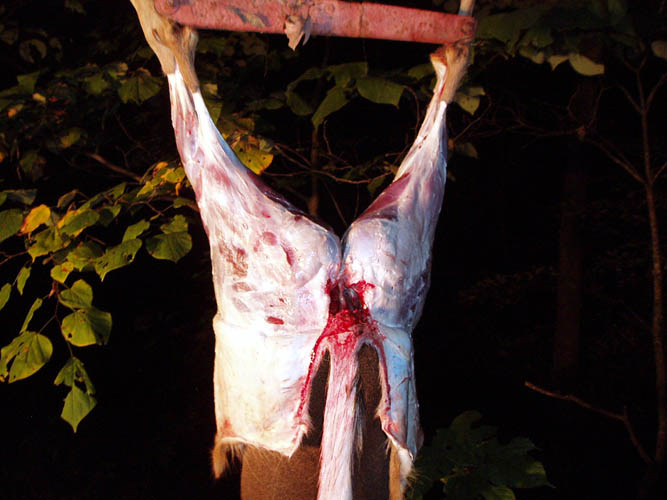
After both hindquarters are skinned out to the base of the tail, you can
either use your knife or a meat saw to several the tail bone leaving the
hide attached to it. The meat saw works much better than the knife
blade.
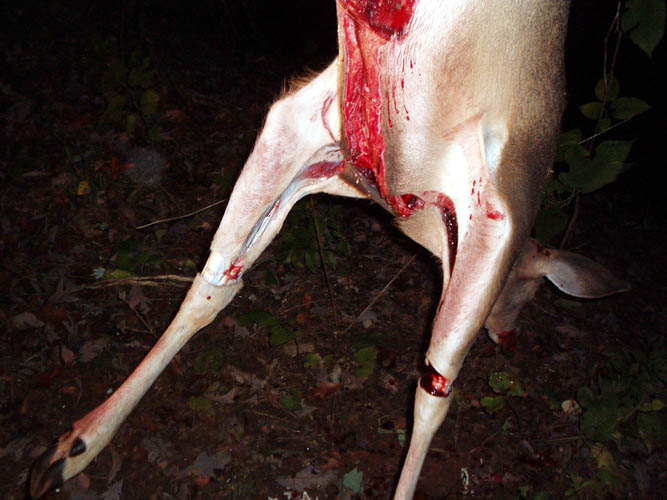
I usually cut around the front legs and make a cut on the inside of each
leg terminating at the breastbone and then make a cut from the breastbone
all the way to the deer's throat in order to remove the hide at the base of
the deer's skull. You can see the blood shot area of the entire right
quarter in this pix.
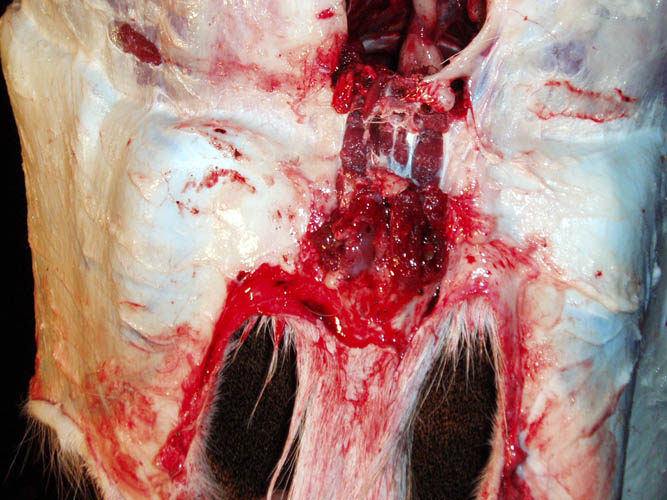
The above pix of the tail bone cut through and still attached to the hide.
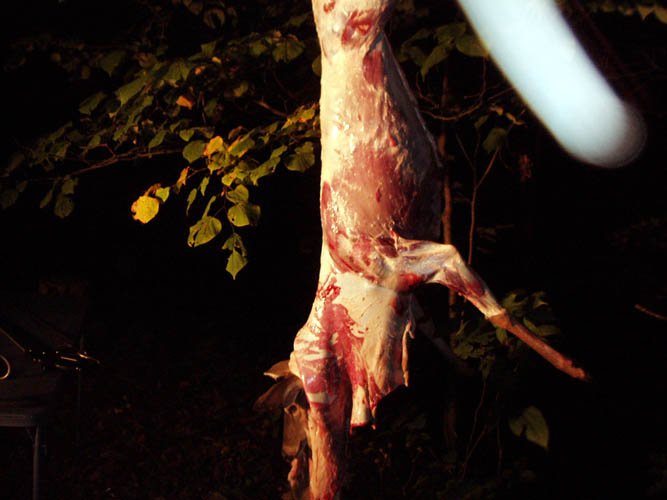
Continue pulling the hide from the deer carcass until you reach the
deer's head. The above deer was badly blood shot by the arrow that
traveled through the deer's shoulder and most of the neck was blood shot as
well, therefore I decided not to utilize the blood shot meat and will leave
out separating the front quarters from the deer and also the removal of the
deer head and neck area. I will add additional pixs of the next deer
harvested to complete the sequence.
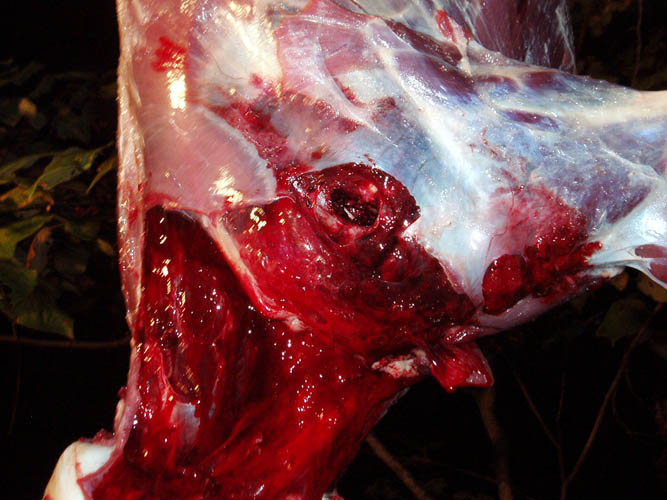
This pixs show the blood shot areas I was talking about in the above
paragraph. My arrow placement on this deer was about 6 to 8 inches too
far forward which caused all the blood shot damage and the deer crashing
into small saplings and undergrowth as it exited the area.
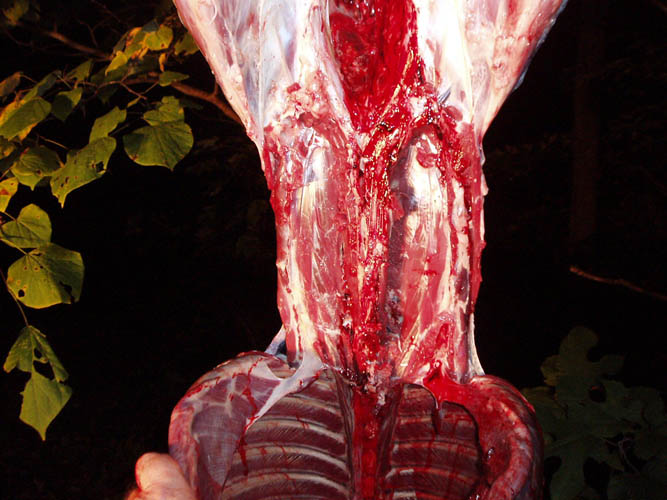
Once the entire deer is skinned, I next removed the tenderloins from the inside
of the deer. This is the most tender part of the deer since those
muscles apparently never get stressed any.
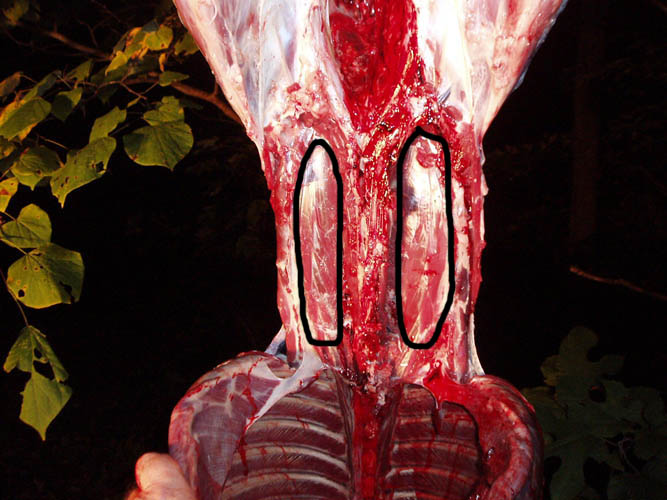
Above pix has the tenderloins outlined using PhotoShop CS2 that will be removed.
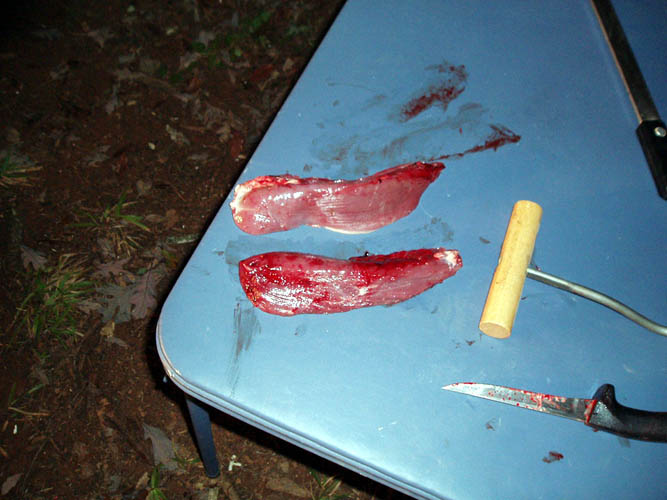
Pix of the tenderloins removed. This is the
filet mignon of venison!
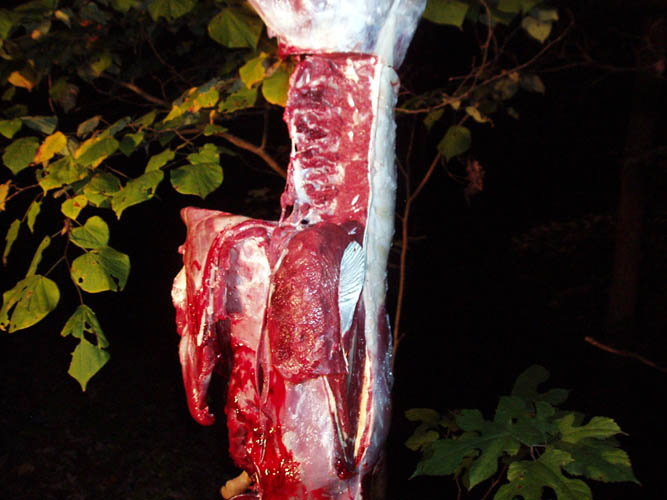
A horizontal cut above the hindquarters next to the last ribs is made on both sides
of the loins or back strap and a vertical cut is made beside the center
of the spine to the neck aiding in removing each loin. Use the tip of your knife
and cut close to the rib cage and spine to keep from wasting any meat.
The loin renders some excellent cubed steak.
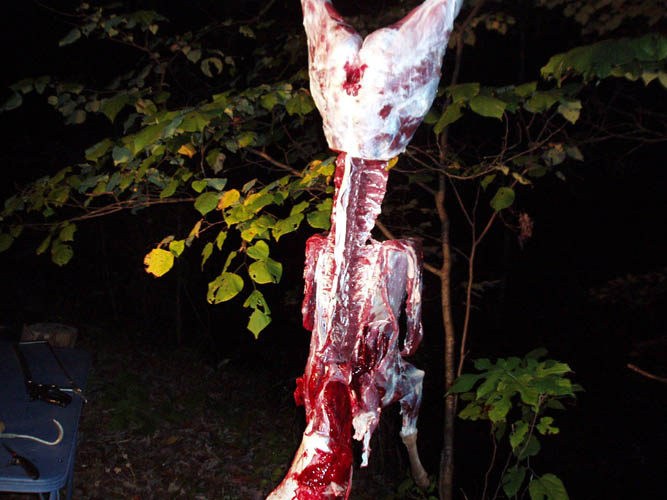
Both loins aka back straps are removed from the deer and will be aged and
later sliced into steaks and hand cubed. Normally, the next step would
be to remove each shoulder and the sever the head from the neck and remove
the neck for ground venison and/or a neck roast. Removing the neck
requires the usage of the meat hook while sawing through the spine with the
meat saw.
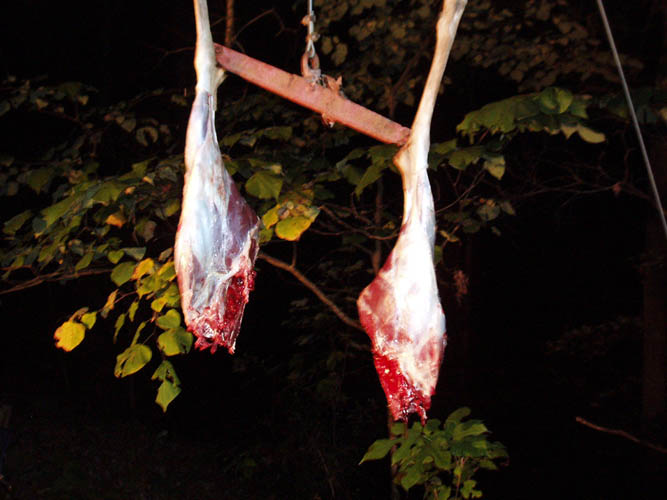
The hindquarters are removed from the carcass and then cut in two at the
pelvic bone using the meat saw. You need three hands when trying to do
this and get a pix at the same time so left off showing the meat saw in
actual usage.
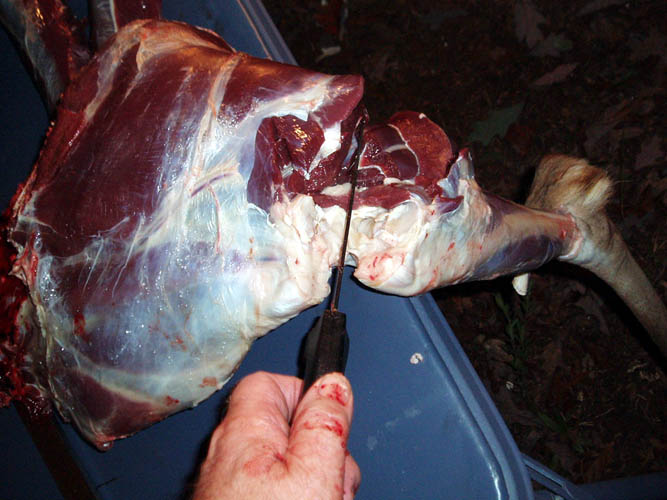
Remove the lower shank from the hindquarter by making a cut across at
into the ball
point. It takes practice to find the connecting joint with your first
try and work the knife blade between the joint and the shank portion can be easily
removed. The lower shank portion contains edible meat and
will clog your meat grinder blades up due to all the gristle and sinew, etc.
However, the shank will make some tasty venison if
braised in a Dutch oven
or similar pot with a tight fitting lid.
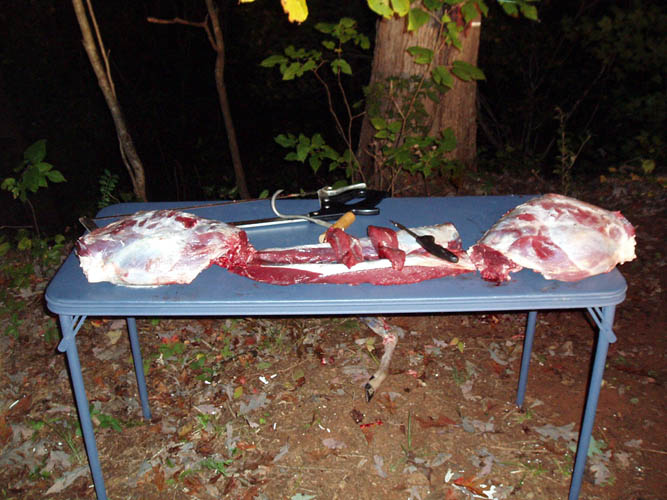
Pix above of the hindquarters, loin straps and small tenderloins ready to
be placed in plastic garbage bags that are not sealed tight and placed in my
game
refrigerator with the temperature around 35 to 40 degrees. I allow the deer
to age about 3 to 6 days before further processing. See my
Venison Chop Shop page for the final
steps of processing a deer.
I did not show a pix of the front shoulders and neck which were badly
bloodshot.
The above sequence pixs is definitely not the only way to skin and
quarter a deer and many that do not
field dress a deer will remove the entire skin, then remove the deer
parts while the deer is hanging and bone out the hindquarters while attached
to the carcass, remove the
loins, shoulders and then the neck with the viscera
(internal body organs) still inside the cavity.
If you can accomplish this without any delay in time from the actual
harvest, the meat should still be very palatable, however many hunters will
transport their buck around for several hours showing off their trophy before having
it processed which is definitely not the way to handle any wild game in my
humble opinion. Check the below YouTube video out of skinning a deer
in less than 2 minutes:
Deer Skinning
Web published by Bill aka Mickey Porter on 10-11-13.
LEAVING ON A
SPIRITUAL NOTE
If you do not know Jesus Christ as your Lord and Savior, please take
this moment to accept him by Faith into your Life, whereby Salvation
will be attained.
Ephesians 2:8 - 2:9 8 For by grace are ye saved through
faith; and that not of yourselves: [it is] the gift of God: 9 Not of
works, lest any man should boast.
Hebrews 11:1 “Now faith is the substance of things hoped for,
the evidence of things not seen.”
Romans 10:17 “So then faith cometh by hearing, and hearing by
the word of God.”
Open this
link about faith in the King James
Bible.
Romans 10:9 “That if thou shalt confess with thy mouth the
Lord Jesus, and shalt believe in thine heart that God hath raised him
from the dead, thou shalt be saved.”
Open this
link of Bible Verses About Salvation,
King James Version Bible (KJV).
Hebrews 4:12 “For the word of God is quick, and powerful, and
sharper than any two edged sword, piercing even to the dividing asunder
of soul and spirit, and of the joints and marrow, and is a discerner of
the thoughts and intents of the heart.”
Romans 6:23 “For the wages of sin is death; but the gift of
God is eternal life through Jesus Christ our Lord.”
Romans 3:23 “For all have sinned, and come short of the glory
of God;”
Micah 6:8 “He hath shewed thee, O man, what is good; and what
doth the LORD require of thee, but to do justly, and to love mercy, and
to walk humbly with thy God?”
Philippians 4:13 "I can do all things through Christ which
strengtheneth me."


